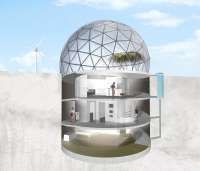“UDLU” Underground Desert Living Unit
The UDLU (Underground Desert Living Unit) is a conceptual single-family dwelling installed below the surface of a desert ecosystem.
PROJECT
Create and install “UDLU” demo house in the Chihuahuan Desert.
PRIMARY GOAL
Demonstrate the viability of UDLU as a low-cost, prefabricated, sustainable, modular, eco-friendly, single-family dwelling that is an adaptation response to the future loss of human habitat arising from the decline of fertile land, the growth of deserts and the creation of millions of global warming refugees around the world due to the effects of anthopogenic climate change.
SECONDARY GOAL
Demonstrate the viability of UDLU as a practical carbon-neutral site for total ecosystem conservation, including the sustainable utilization and conservation of regional flora (e.g., agave, creosote, yucca, grasses), fauna (e.g., prairie dogs, wild American bison, pronghorn antelope), soil and groundwater.
BACKGROUND
The Underground Desert Living Research Institute (UDLRI) was founded in 2008 by New York-based writer, artist and environmental activist Reynard Loki to promote the research and development of the UDLU. Loki also runs 13.7 Billion Years (http://www.13point7billion.org), an “armchair activist” blog covering daily news reports on natural science, conservation, animal welfare and the environment.
NOTES
A 2008 study by Benjamin Duval and Walter Whitford of New Mexico State University found that the mesquite girdler beetle (Oncideres rhodosticta) is hastening the degradation of grasslands in the Chihuahuan Desert. Part of the UDLU project will be to determine if the UDLU can exist as a site for indigenous grass preservation and cultivation to help combat the destruction caused by the mesquite girdler.
http://www.eurekalert.org/pub_releases/2008-03/w-sdb032708.php
“The Chihuahuan Desert encompasses one of the most biologically diverse arid regions on Earth. This ecoregion extends from within the United States south into Mexico. This desert is unique, as it has been sheltered from the influence of other arid regions such as the Sonora Desert by the large mountain ranges of the Sierra Madres. This isolation has allowed the evolution of many endemic species; most notable is the high number of endemic plants. However, this ecoregion also sustains some of the last remaining populations of Mexican prairie dogs, wild American bison and pronghorn antelope.”
http://www.worldwildlife.org/wildworld/profiles/terrestrial/na/na1303_full.html
“UDLU” Underground Desert Living Unit
The UDLU (Underground Desert Living Unit) is a conceptual single-family dwelling installed below the surface of a desert ecosystem.
PROJECT
Create and install “UDLU” demo house in the Chihuahuan Desert.
PRIMARY GOAL
Demonstrate the viability of UDLU as a low-cost, prefabricated, sustainable, modular, eco-friendly, single-family dwelling that is an adaptation response to the future loss of human habitat arising from the decline of fertile land, the growth of deserts and the creation of millions of global warming refugees around the world due to the effects of anthopogenic climate change.
SECONDARY GOAL
Demonstrate the viability of UDLU as a practical carbon-neutral site for total ecosystem conservation, including the sustainable utilization and conservation of regional flora (e.g., agave, creosote, yucca, grasses), fauna (e.g., prairie dogs, wild American bison, pronghorn antelope), soil and groundwater.
BACKGROUND
The Underground Desert Living Research Institute (UDLRI) was founded in 2008 by New York-based writer, artist and environmental activist Reynard Loki to promote the research and development of the UDLU. Loki also runs 13.7 Billion Years (http://www.13point7billion.org), an “armchair activist” blog covering daily news reports on natural science, conservation, animal welfare and the environment.
NOTES
A 2008 study by Benjamin Duval and Walter Whitford of New Mexico State University found that the mesquite girdler beetle (Oncideres rhodosticta) is hastening the degradation of grasslands in the Chihuahuan Desert. Part of the UDLU project will be to determine if the UDLU can exist as a site for indigenous grass preservation and cultivation to help combat the destruction caused by the mesquite girdler.
http://www.eurekalert.org/pub_releases/2008-03/w-sdb032708.php
“The Chihuahuan Desert encompasses one of the most biologically diverse arid regions on Earth. This ecoregion extends from within the United States south into Mexico. This desert is unique, as it has been sheltered from the influence of other arid regions such as the Sonora Desert by the large mountain ranges of the Sierra Madres. This isolation has allowed the evolution of many endemic species; most notable is the high number of endemic plants. However, this ecoregion also sustains some of the last remaining populations of Mexican prairie dogs, wild American bison and pronghorn antelope.”
http://www.worldwildlife.org/wildworld/profiles/terrestrial/na/na1303_full.html
